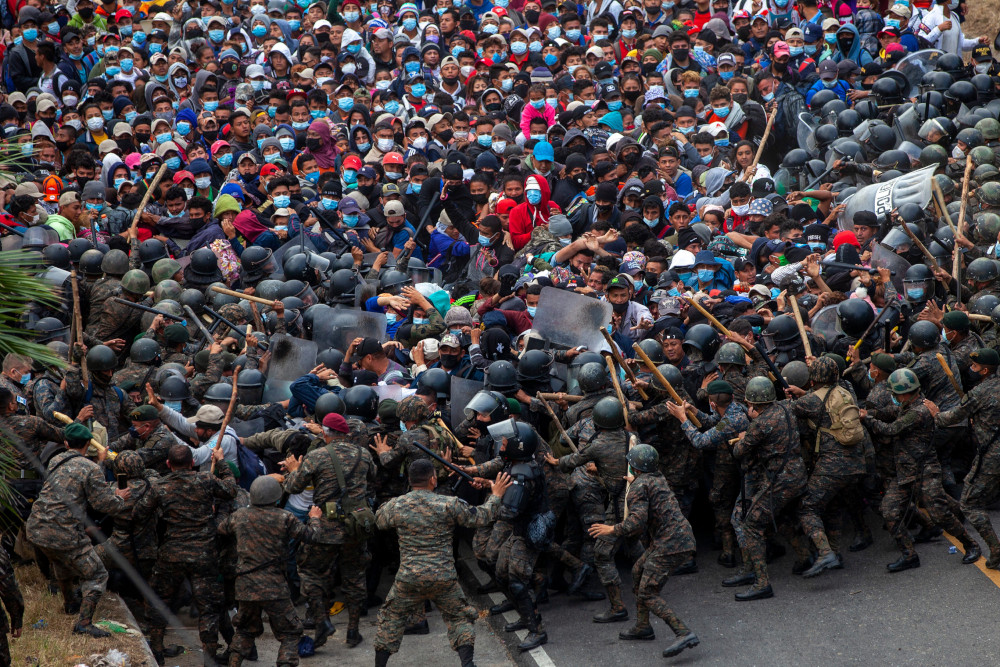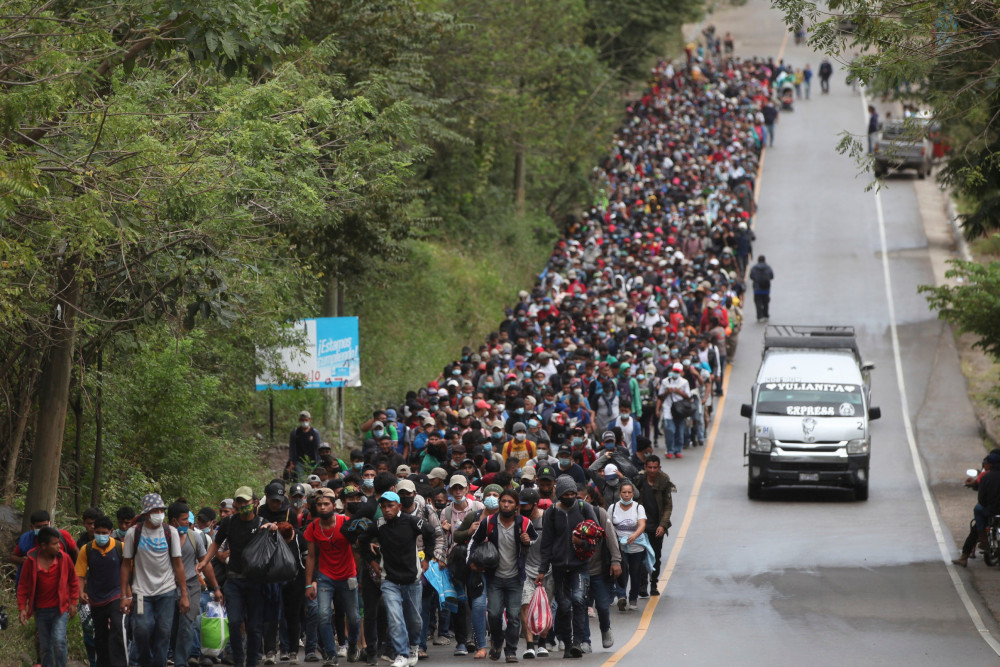
Honduran migrants clash with Guatemalan soldiers in Vado Hondo, Guatemala, Sunday, Jan. 17, 2021. Guatemalan authorities estimated that as many as 9,000 Honduran migrants crossed into Guatemala as part of an effort to form a new caravan to reach the U.S. border. (AP/Sandra Sebastian)
Honduran migrants encountered tear gas and were struck with sticks as they pushed through lines of Guatemalan soldiers in their trek to reach Mexico and seek asylum in the United States.
They departed from San Pedro Sula, Honduras, early Jan. 15, but by Jan. 19 the large caravan had largely dissolved after a dayslong standoff with Guatemalan security forces. Small groups made it toward the Mexican border, while others agreed to be sent back to Honduras on buses arranged by Guatemalan officials.
Faith groups and religious leaders found the violence at the border disturbing and are urging newly inaugurated U.S. President Joe Biden, who has promised to take a different approach to immigration, to steer away from hard-line policies that would make it difficult for migrants to seek asylum. They also urged Guatemalan and Honduran leaders to treat the thousands of Hondurans fleeing their country as a refugee crisis.
Catholic activist Dylan Corbett, the executive director of El Paso-based Hope Border Institute, said on Twitter that the exodus of the thousands of migrants could be the "first moral test for Biden."
Brenda Peralta, with JPIC Familia Franciscana Unida de Guatemala, a commission that's part of the Catholic Order of Friars Minor, said it was "tone-deaf" to tell people "who have lost their homes and possessions" to return home.
"Confronting people fleeing violence, extortion, and corruption with more violence is inhumane," Peralta said in a statement.
Peralta and Corbett are part of what's known as the Roots Causes Initiative — a new coalition of more than 300 grassroots and faith-based organizations from Central America, Mexico and the U.S. — that is urging Biden to address the factors causing migration, which include corruption, poverty, violence and climate change.
The caravan included as many as 9,000 migrants escaping violence and poverty intensified by the coronavirus pandemic, which has pushed an estimated 250,000 families across the country into hunger, and recent hurricanes that damaged more than 85,000 homes and sent thousands into shelters.
The network wants to undo many of former President Donald Trump's actions that installed the "Remain in Mexico" program and allowed the U.S. to send asylum-seekers to Central American countries and request asylum there. But the network also makes it clear that it doesn't want to revert to Obama-era policies that saw a record number of deportations and the detainment of Central American families who sought asylum in the U.S.
Among the faith-based stakeholders involved in advising the coalition are: Hope Border Institute; the congregation-based organizing network Faith in Action; Comunidades de Fe Organizadas en Acción (Organized Communities of Faith in Action) in El Salvador; La 72, a migrant shelter and human rights organization in Tabasco, Mexico; and JPIC Familia Franciscana Unida de Guatemala.
Religious leaders, largely Catholic and Episcopalian, who have endorsed this initiative include El Paso Bishop Mark J. Seitz, Guatemalan Cardinal Álvaro Ramazzini Imeri, El Salvador Bishop Elías Bolaños Avelar, San Diego Bishop Robert McElroy, Los Angeles Bishop John Taylor and San Diego Bishop Susan Brown Snook.

Honduran migrants hoping to reach the U.S. border walk alongside a highway in Chiquimula, Guatemala, Saturday, Jan. 16, 2021. Guatemalan authorities estimated that as many as 9,000 Honduran migrants have crossed into Guatemala as part of an effort to form a new caravan to reach the U.S. border. (AP/Sandra Sebastian)
Seitz and Imeri, in a joint Dec. 10 letter addressed to Biden, said past immigration policies "have fallen short because they did not meet the height of human rights." They said those efforts were too focused on security and failed to work with civic and faith-based groups "that know best what changes are needed for people to see their future in their communities and countries."
"In a region deeply connected by family, religious and economic ties, fundamental change requires new safe and legal ways for people to reunite with family, work and seek refuge," they wrote.
The coalition calls on Biden to invest in long-term commitments such as reconstructing a regional asylum system that adjusts to international law, standing with Central American groups organizing against mining and mega projects threatening the water of communities, and focusing on trade policies that protect workers' rights.
But as Honduras still reels from the destruction of Hurricanes Eta and Iota, the coalition is also urging Biden to commit to short-term actions like providing increased emergency funding to the U.S. Agency for International Development to help people rebuild their homes and infrastructure and extending temporary protected status to those from areas affected by the hurricanes who were in the U.S. on Nov. 3, 2020.
The group is also calling on Biden to work with the Pan American Health Organization to increase access to COVID-19 vaccines in Central America as well as end the "Remain in Mexico" program that has been found to expose asylum-seekers to violence, illness and trauma while they wait for their court hearings.
In December, the coalition had a meeting with Biden transition officials, who Gordon Whitman of Faith in Action, said were "very positive" that the initiative exists. In attendance were representatives of Central American groups advocating for roads, bridges, health clinics and cleaner water, Whitman said.
"People are leaving for a lot of reasons, including violence, but underlying the way in which the climate crisis and climate change is causing drought, and forcing farmers off their land, and causing more serious natural disasters, is a big part of what's happening in the region," Whitman told Religion News Service.
Peralta, with JPIC Familia Franciscana Unida de Guatemala, was at that meeting.
Because Biden has identified so strongly as a person of faith, Peralta believes the president can "work with principle and make the effort" to abandon policies that militarize the border, she told RNS.
Peralta also wants Biden to address the corrupt governments that Trump favored in Guatemala and Honduras, whose president, a Trump ally, has been linked to drug trafficking.
For Corbett, of Hope Border Institute, it makes sense for religious organizations to make these demands. In the border city of El Paso, he said, they've experienced firsthand the impacts of anti-immigration policies under the Trump and Obama administrations.
Along the U.S.-Mexico border, "it's faith groups that are every day working in the shelters in Mexico to give people a meal and to give people safety and refuge," Corbett said.
"It's faith groups that are receiving people on the U.S.-Mexico border," he added.
The Associated Press contributed to this report.
Advertisement







